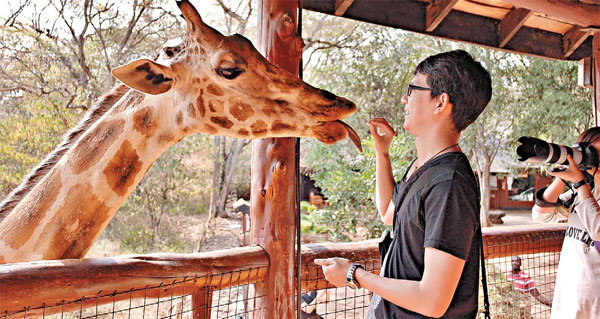Jewels of Kenya showcased for Chinese tourists
|
A Chinese tourist feeds a giraffe in the Giraffe Centre in Langata, Kenya. Provided to China Daily |
As Kenya becomes a Chinese safari destination owing to the spectacular Maasai Mara wildebeest migration, Chinese tour operators and agents are thinking about how to cash in on the opportunity.
Most of them set up shop only two years ago, but they're already reporting impressive performance. The future is looking brighter as Chinese tourists develop positive perceptions about the country.
The various marketing campaigns by the Kenya Tourism Board have helped position the country as a preferred destination.
The board is in the process of rolling out more programs to target second-tier cities in China where people are less familiar with Kenya as a tourism destination. Previously, it concentrated its marketing campaigns on Beijing. The new efforts are expected to produce an increase in the number of Chinese visitors.
July through October is peak season for Chinese tour operators. During that period, over 2 million animals migrate from Serengeti National Park in Tanzania to greener pastures in Kenya's Maasai Mara National Reserve. This magnificent migration is the key attraction for Chinese tourists.
Diana Jie, general manager of China Excellence Tour and Safari Co, founded in 2014, says that between July and September, her company recorded 10 million yuan ($1.5 million; 1.3 million euros; 1.2 million) cash flow and booked 1,500 tourists.
She says, she intends to grow the cash flow to 20 million yuan in 2017 and 30 million yuan in 2018.
On the other hand, William Zhuo, managing director of This is Africa (K) Travel Agency, says his company booked more than 80 groups last year, with each consisting of 10 to 12 members. His target is to increase bookings to 3,000 visitors by the end of next year.
Sherry Xie, managing director of Longren Tours and Travel, the oldest tour company in Kenya (established in 1998), says his company booked 4,000 visitors last year and recorded $5 million in cash flow.
Sunshine Adventure Africa booked 300 groups of visitors consisting of 10 to 20 people each, according to Irene Liu, the company's sales manager.
The tour companies are focusing on training their employees and identifying more attractive products to grow their revenues.
For instance, they are recommending other tourist attractions available in the country to their clients. Apart from the wildlife migration, Kenya offers such diverse gems as thousands of flamingos in Lake Nakuru; obsidian caves and the hisses of natural geysers and hot springs at Hell's Gate National Park; plus calderas, mountain ranges and the great Rift Valley, which offers stunning views.
This is in addition to coral reefs, pearly beaches and tropical islands steeped in Swahili culture in the coastal regions of the country.
The companies are also selling new activities, such as golf, to attract visitors throughout the year. Kenya boasts around 40 golf courses.
"China has a big number of golfers who should experience Kenya. The country is a good destination for a golf holiday," Xie says.
Partnership with tour operators in other countries is another growth strategy being utilized by the companies. Noting that most Chinese tourists visit the country for the wildebeest migration, Zhuo says he is looking to other markets to grow his revenues. Toward that end, he has signed agreements with tour operators in Switzerland and Dubai to exchange tourists.
Xie, on the other hand, says she has signed partnerships with tour operators in Mauritius, Republic of Seychelles, Egypt, Tanzania, South Africa, Rwanda and Uganda.
Focusing on other markets, such as Europe and the United States, Zhuo says, has resulted in bookings throughout the year. Every day, he books at least two to three groups.
He is especially keen on increasing his Chinese client base, which is the core of his company. Recently he traveled to China and signed agreements with several tour companies, projecting between 2,500 and 5,000 Chinese clients next year.
Jie and Liu say their companies are working toward strengthening offerings through market surveys.
A shortage of adequate high-end accommodation in Kenya has been one of the key challenges facing the companies. Xie says. During this year's peak season, she couldn't book a group of 40 tourists because the high-end hotels, which Chinese tourists prefer, had been filled to capacity.
According to the tour operators, Chinese tourists book hotels six months in advance to get a room near Maasai Mara, even when the prices rise to double or triple the norm.
For the safety of tourists, established operators believe the Kenyan government should provide more supervision of tour companies, because some only appear during peak season and vanish thereafter.
"Some of the new travel agents don't follow rules and policies. A tour guide should have a license to avoid cases similar to the killing of a tourist by a Chinese tour guide at the Keekorok Lodge in the Maasai Mara National Reserve in August," Xie says.
While the Kenyan government has done a lot to market the country in China as a tourist destination, the tour operators say much more needs to be done to attract China's outbound tourists.
edithmutethya@chinadaily.com.cn =



















